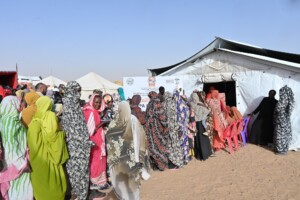Abdelwahid El Nur: ‘Sudan Call a marketing tool for Al Bashir regime’
The head of the mainstream Sudan Liberation Movement (SLM-AW), Abdelwahid El Nur, whose forces are currently engaged in deadly clashes with government forces in Jebel Marra, has sharply criticised the outcome of the Paris meetings of the Sudan Call Forces.
 The head of the Sudan Liberation Movement (SLM-AW), Abdelwahid El Nur (File photo)
The head of the Sudan Liberation Movement (SLM-AW), Abdelwahid El Nur (File photo)
The head of the mainstream Sudan Liberation Movement (SLM-AW), Abdelwahid El Nur, whose forces are currently engaged in deadly clashes with government forces in Jebel Marra, has sharply criticised the outcome of the Paris meetings of the Sudan Call group.
In an interview with Radio Dabanga to be broadcast today, El Nur deplores that in Paris, the Sudan Call forces dropped the International Criminal Court and military resistance from the agenda.
He said that “the opposition, following the option of dialogue and compromise with the regime, has become a marketing tool of the government internationally.
"Now that the Sudan Call forces have been structured, the Khartoum government began a military attack on us from all directions in Jebel Marra.”
Choice: Normalisation or regime change
El Nur asserts: “The choice before the Sudanese people is now clear; between an opposition that wants normalisation with the regime, and opposition that wants to change the regime and overthrow it by military and popular means.”
He appealed to all the forces who believe in the normalisation with the regime to rather for a united front to change the regime and overthrow it in Khartoum.
El Nur denied reports that the African Union had sent a letter to him with the option of whether to go to negotiations, to compromise with the government, or face sanctions. “There has have been no contact between me and the African Union since my last visit to Addis Ababa in September 2014.”
He said he would not join any negotiations unless security is achieved first on the ground, disarming militias, and returning displaced people and refugees to their homes and villages after giving them individual and collective compensation.











 and then
and then